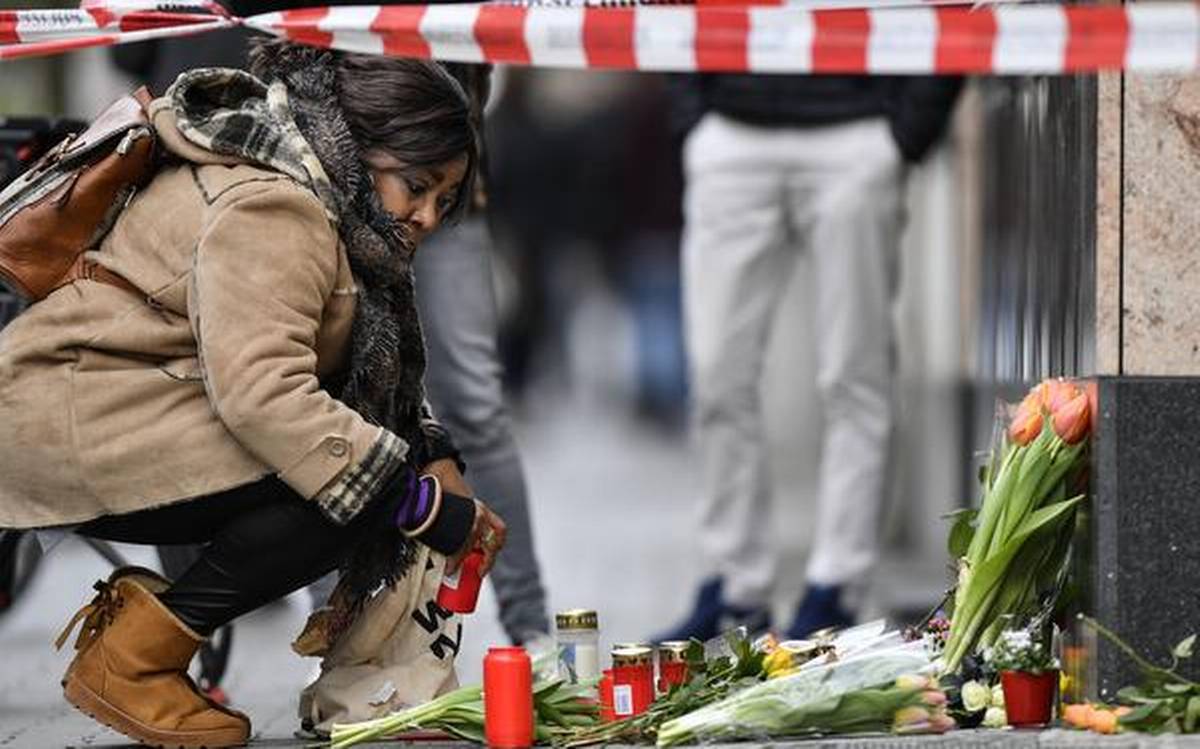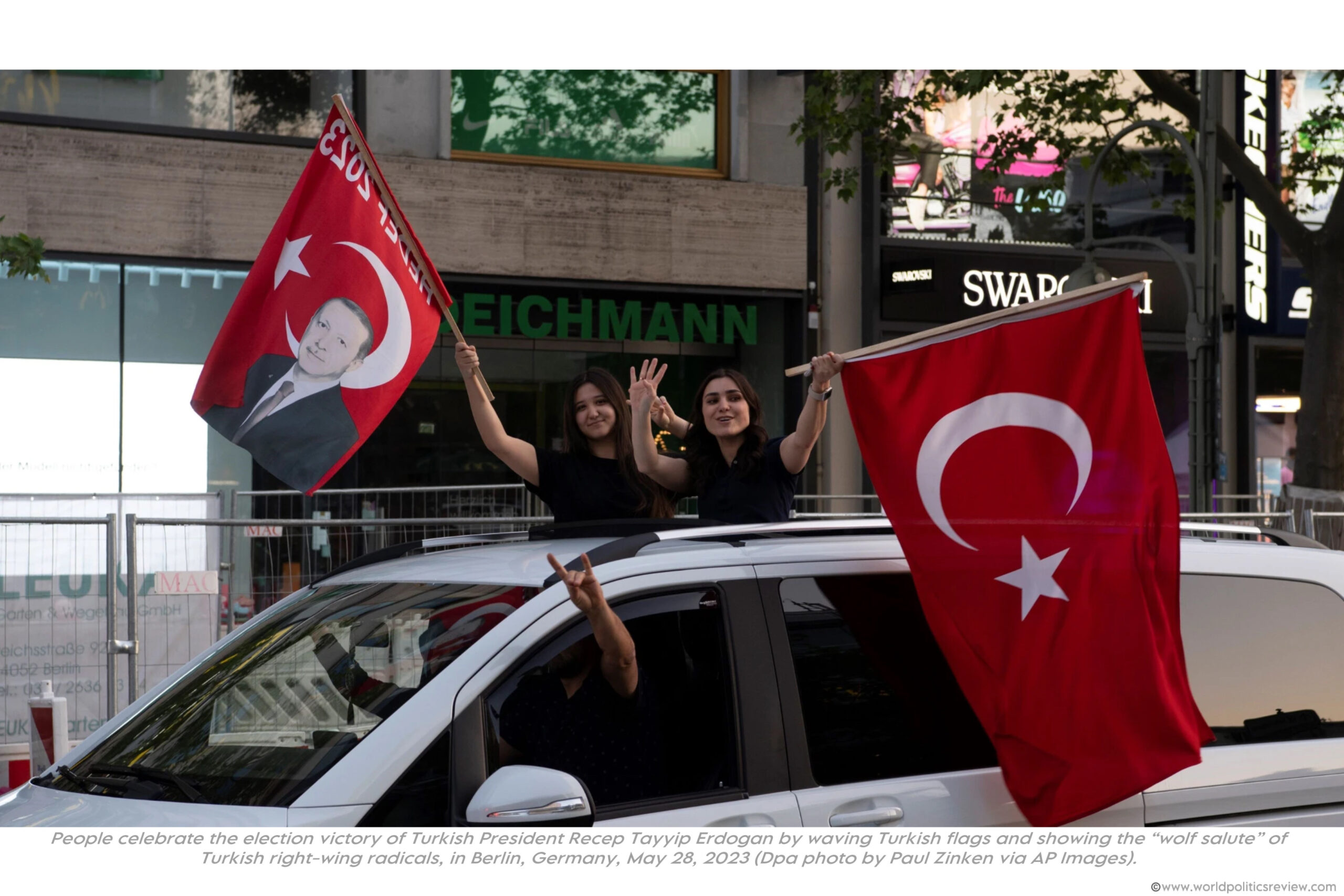Germany has been rocked by one of the worst far-right attacks in its recent history: at around 10pm local time on the evening of Wednesday, February 19, a gunman opened fire on two Shisha bars in the town of Hanau, around 25km from Germany’s financial capital Frankfurt.
Racially motivated gun attacks on two hookah establishments
After having killed four in a shisha joint in the town centre, the perpetrator drove to a second hookah bar on the town’s outskirts, killing five there. Returning to his home, he proceeded to end the lives of his mother and himself.
The crime is clearly racially motivated: the 43-year-old attacker, a white German national, uploaded videos and pamphlets online, detailing his hatred for ‘foreigners’, his belief in the superiority of the white race, and reflecting on which countries and populations would have to be ‘exterminated’ in order to ensure the world’s well-being. All of his victims were of Turkish or Kurdish descent, some holding German nationality, others a Turkish passport.
A far-right scene awash with weapons
Little further information is available at this stage on either the attacker or his victims. The perpetrator appears to have been an avid sporting marksman, who obtained his weapons legally. This has led to critical questions about whether Germany’s gun control regulations are sufficient. Indeed, Germany – given its vibrant scene of shooting sports clubs – has one of the highest gun densities in Europe.
And the German right-wing scene is, in fact, awash with guns. Groups such as the far-right Reichsbürger – a conspiracy movement that believes the Federal Republic to be no sovereign state but an American-controlled company, and that calls for a return to the constitution and borders of the German Reich of 1871 – have hoarded weapons. And just last week, investigators uncovered a far-right terrorist cell planning attacks on 10 mosques across the country, aiming to kill a maximum number of people during prayer time. One of their members had been a policeman responsible for the issuing of gun licences.1
Politicians’ shock and disbelief after the attack
German political leaders have reacted with shock and disbelief to the attack of Hanau.2 Quickly, ritualised expressions of ‘thoughts and prayers’ segued into calls for national unity: German President Frank-Walter Steinmeier stated that “what has happened […] in Hanau leaves us bewildered, sad, and angry.” Yet Steinmeier asserted that “we stand together, we stick together, we want to live together”. Such solidarity would be “the strongest means against hatred”, or so he said.3
Chancellor Merkel took a somewhat more combative line, castigating “racism” as “a poison” percolating in German society that had already claimed many lives. These statements were echoed by Annegret Kramp-Karrenbauer, leader of Merkel’s conservative party.4
Criticising official ‘bewilderment’
Yet a small number of political figures took issue with official displays of shock and with formulaic calls for unity. Social Democratic parliamentarian Helge Lindh criticised the fact that German officials had never taken the victims of racism seriously in the past: “Whoever speaks of Hanau and Halle [two recent sites of racist gun attacks] must not remain silent about the permanent exclusion and paternalistic disregard of victims over the past years.”
Lindh pointedly asserted that what was at issue was not an attack on ‘all of us’ or on ‘our way of life’. For the violence was directed at specific groups rather than at the German nation as a whole – at Muslims, Jews, and racialised minorities. Hence, repetitive invocations of some national ‘we’ as the alleged target of racism was dishonest and erased uncomfortable truths in favour of a more reassuring story of common resilience. Yet “as long as we do not see things with the eyes of the victims, we have understood nothing”, Lindh stated.5
Hanau attack “does not surprise us”, Germany’s minorities say
Reactions to the Hanau attack show that most Germans whose skin colour, names, or cultural practices mark them as non-white and/ or non-Christian would agree with Lindh. To them, President Steinmeier’s exclamation that “nothing can explain this senseless deed”6 epitomises the complacency of Germany’s political class in the face of rampant racism.
In fact, Muslims, Jews, and white Germany’s ‘racial Others’ more broadly do not find the attack inexplicable or bewildering at all. Speaking to the Die Zeit newspaper, minority activists note: “The attack of Hanau does not surprise us.”7
Karim El-Helaifi of the Neue Deutsche Organisationen network – a civil society group bringing together progressive voices from racial and religious minorities – observes that “for years we have been talking about the fact that violence is on the rise and is being normalised; and we’ve known for a long time how great the threat is.” Speaking of minorities’ everyday life in Germany, El-Helaifi notes that “we are pondering three times whether we go out on our own, and where we can stay out. We simply don’t have the luxury of not doing that. But that’s only being perceived publicly when someone is killed.”8
Anger at political leaders’ complacency and complicity
Meron Mendel of the Anne-Frank Centre, an educational NGO active in the prevention of anti-Semitism, concurs: “The attack of Hanau is a big shock. But it doesn’t surprise us”. For Mendel and his colleagues have experienced years of increasing far-right verbal intimidation and physical attacks, both directed at their organisation’s premises and at its employees.9
In line with the utter predictability of the attack, writer Nadire Y. Biskin took to Twitter, asking “why are you surprised about #Hanau given such facts?” She proceeded to cite a scientific study that had zoned in on the discriminatory representation of foreigners and racial minorities in German media discourses. Notably, suspects in criminal investigations who do not hold a German passport are mentioned 32 times more often in German newspapers than would be proportionate to their actual share in crime statistics. It was unsurprising, Biskin asserted, that such representations yielded material consequences in Hanau.
Warum wundert ihr euch über #Hanau bei solchen Fakten?
'Laut der Studie werden ausländische Tatverdächtige in Fernsehberichten 19 Mal häufiger erwähnt, als es ihrem statistischen Anteil entspricht. Bei Zeitungsberichten liegt die Zahl bei dem 32-fachen.
— Nadire Y. Biskin (@tochtersatire) February 20, 2020
Taking up German politicians’ empty phrases intended as a response to the Hanau shooting, another user struck a similar tone: “Horst Seehofer notes that racism is poison. Does that mean that he is finally going to step down and won’t give public speeches anymore? That would really be a little dream. Because FYI Horst – you’ve participated in breeding racists.”
Horst Seehofer stellt fest, dass Rassismus Gift ist. Bedeutet das, dass er endlich zurücktritt und keine öffentlichen Reden mehr halten wird? Das wäre wirklich ein Träumchen.
Denn FYI Horst – du hast die Brut mitgezüchtet. #hanau
— Don Birgit Alphansa Reichelt-Poschardt Blome (@Hatice_Ince_) February 20, 2020
Indeed, German Interior Minister Seehofer has a long history of anti-Muslim comments: immediately after taking office, he stressed that ‘Islam’ was not and could not be an acceptable part of Germany’s identity. Subsequently, he castigated immigration as ‘the mother of all social problems’, and orchestrated a pronounced right-ward shift of his party, in order to win back votes from the far-right.
Exasperated reactions from largest Islamic associations
Germany’s largest Islamic organisation reacted with similar exasperation. Overcoming their usual factionalism, many of the country’s Muslim associations came together to publish a press release in the aftermath of the attack, noting that “it is this right-wing terrorism that we had been warning of for weeks and months. We had demanded that a stand be taken against right-wing hatred and Islamophobia”. These calls, however, had went unheeded, or so the signatories concluded.
Erklärung des #KRM zu #Hanauterror pic.twitter.com/SP5OrN6cN2
— Khallad Swaid (@KhaludeD) February 20, 2020
Aiman Mazyek of the Central Council of Muslims in Germany doubled down on his criticism: “How many innocent dead, how many violent assaults, how many arson attacks, how many bomb threats, how many incitements to murder against migrants and Muslim representatives still need to happen before police and security authorities protect Muslims, mosques, migrants and their institutions effectively?”10
Murat Kayman, chairman of the Alhambra Society – a more academic, intellectually-focused forum for Muslim debate – noted that “We finally need to accept that there are racist terrorists among us […] and that their reasons to hate and to kill are made of the shreds and pieces taken from the exclusionary debates of the past years.11
Taking racism and the far-right seriously
In this context, many commentators demanded that policy-makers and media commentators no longer focus on the supposed fears of a white majority, obsessed with the putative dangers of Germany’s ‘Islamisation’. Instead, they argued, the objective adn very real threat against non-white people living in the country had to be taken seriously once and for all.
Gökay Sofuoğlu of the Turkish Community in Germany, an independent civil society organisation seeking to uphold the interests of Germany’s largest ethnic minority, stated that “What is necessary is security agencies’ complete and durable focus on right-wing extremism. People who are impacted by racism, discrimination, and racist violence need to have the feeling that this country and this constitution are offering them protection. As a first step we demand a parliamentary investigation committee dealing with right-wing terror and racism!”
#Hanau pic.twitter.com/rIzD6Ovbae
— Gökay Sofuoglu (@gsofuoglu) February 20, 2020
Writer Mohamed Amjahid said that “I would wish that that in Germany we could finally talk about racism and racially motivated violence, and that the majority doesn’t feel offended immediately. It is not just important to expose these deep-seated, racist structures in German society; for minorities it is a matter of survival.”12
Shrinking ‘safe spaces’ for racial and religious minorities
In line with this sense of growing insecurity, many expressed a sense of claustrophobia, as an ever-larger number of sites of everyday life appeared to fall prey to racist attacks. In fact, for many – particularly young, racialised Muslim men – shisha bars had been important ‘safe spaces’ for socialising and for a comparatively hassle-free evening.
Nadire Biskin tweeted about what she termed the “Hanau monologues” – her telling her brother: “Mehmet, don’t go to the mosque”, or “Mehmet, don’t go to the shisha bar”. “Where is this boy supposed to go on Fridays?”, she asks. Racial discrimination means that “he’s not allowed into your nightclubs. In your libraries he is allowed as a security guard at most.”
#Hanau Monologe
Ich zu meinem Bruder:
'Mehmet, geh nicht in die Moschee.'
'Mehmet, geh nicht in die Shisha-Bar.'Wo soll dieser Junge freitags hin?
In eure Clubs darf er nicht rein.
In euren Bibliotheken darf er höchstens als Security.— Nadire Y. Biskin (@tochtersatire) February 20, 2020
Satirical website Noktara posted a poll asking “Where can you still go as a foreigner without being at risk?” It offered four options – the ‘mosque’ (routinely targeted by assailants – most recently by the abovementioned plot to shoot Muslims at prayer), the ‘shisha bar’ (attacked in Hanau), the ‘kebab joint’ (privileged sites where the far-right Nationalist Socialist Underground had assassinated people of Turkish descent in the 2000s), or ‘nowhere’. In the aftermath of Hanau, the last option seemed the most likely one.
For some, this sense of claustrophobia gave way to panic. Ali Can, an activist known for his middle-of-the-road, feel-good problematisation of discrimination and exclusion in German society, asked: “What else has got to happen? We are already thinking about where we can flee to when right-wing extremists are taking over the country. Germany doesn’t have the Nazis under control.”13
The far-right obsession with ‘shisha bars’
The feeling about shrinking safe spaces represents an important aspect of the Hanau attack. For it appears clear that the gunman did not select shisha smoking joints at random. In fact, the growing number of hookah-oriented cafés – popular above all with people of Middle Eastern descent and other minorities, but also with younger, urban white left-wingers – have been subjected to virulent hate campaigns by the German far-right.
Above all, the Alternative for Germany (AfD) party – the country’s prime far-right force and political wing of the Islamophobic ‘Pegida’ movement – has made these ‘shisha bars’ a prime target of its propaganda. Their promotional materials (see the tweet below) have routinely zoned in on Shisha bars as insalubrious sites threatening public health, as hotspots of crime and gang rapes, and as lawless zones for the emergence of amorphous ‘parallel societies’.
#AfD-Hetze gegen Shisha-Bars. Immer wieder. Und das hier ist nur eine kleine Auswahl. #Hanau https://t.co/u9eY62Qg1b
— Sawsan Chebli (@SawsanChebli) February 20, 2020
As a result, shisha venues have become a prime site for state repression: speaking to the Süddeutsche Zeitung newspaper, Öner Sönmez, owner of a Berlin-based hookah lounge, recognises that in crime-ridden boroughs, smoking establishments might be a front for illicit business. “But us here – we’re not part of that cliché”, he asserts. Yet Sönmez’ bar suffers the consequences: “The state is trying to force us to close down via all kinds of regulations. We have almost weekly police raids.”14
The role of the AfD party
Shortly before the gun attack on the shisha bars, a leading AfD politician had visited Hanau, spewing anti-immigrant and anti-Muslim hatred in one of the city’s prime event locations. (It is not known whether the assailant attended.)15
More broadly, many commentators pointed to the role of the AfD in preparing the ground for attacks such as the one in Hanau through a strategy of rhetorical escalation and dehumanisation. Indeed, as the AfD has entered all of Germany’s federal and regional parliaments, the number of attempted and successful far-right terror plots has strongly grown.
The recently foiled plot to shoot and kill a large number of Muslims in ten mosques across the country is but one example. Others include the rising number of assassination attempts on local politicians; assaults on synagogues, mosques, and refugee shelters; and the seemingly unending string of far-right terror cells preparing to kill Muslims specifically or all their political opponents more generally.
A long history of racist violence and state complacency or connivance
Yet to focus only on the AfD risks obscuring the extent to which deadly violence from the far-right precedes this party’s political rise. The most high-profile case in this regard is the racist killing spree of the National-Socialist Underground (NSU) in the early 2000s – which has never been fully investigated. Especially the complicity of German security and intelligence agencies in the group’s existence and its murders shattered many illusions about the state’s ability or willingness to protect its minority citizens.
More broadly, since reunification in 1990, racist violence has claimed the lives of over 200 people. Actual figures might be higher; however, many German authorities have been unable or unwilling to investigate potential racist dimensions of crimes. (Suspicions in this regard have only received further nutrition by the fact that the chief of the Germany’s foremost domestic intelligence agency, put into office to ‘clean up’ after the blunders of the NSU, has become one of the country’s most vocal public supporters of the AfD.)
In spite of their overwhelming concern with ‘left-wing’ and ‘Islamist’ extremism and their potential pro-right bias, already in 2018 security agencies were forced to admit that the number of 4,622 ‘left wing extremist’ crimes was dwarfed by the 19,409 cases associated with the extreme right.16
Looking beyond Hanau
Whether the Hanau attack will bring about genuine institutional change thus remains to be seen. On the one hand, Germans Muslims and citizens of diverse descent are today better equipped to make their voices heard than in the past. Compared to the Turkish communities who were targeted by a string of deadly arson attacks in the early 1990s, for instance, German Muslims today have more social capital at their disposal; and they are perhaps less concerned with not offending the sensibilities of the white, post-Christian majority.
On the other hand, while racist violence clearly precedes the rise of the AfD, the party’s arrival and entrenchment in the German political scene has given a massive boost – discursively, institutionally, and financially – to racist arguments and actors. And the bumbling, misplaced reactions of Germany’s political class to the Hanau attack raise questions about their ability to stand up to these developments.
Sources
https://www.spiegel.de/politik/deutschland/terrorverdaechtiger-polizeimitarbeiter-war-fuer-waffenscheine-zustaendig-a-737769ff-eb64-4ba7-90f3-4b7cda01d50a ↩
https://www.sueddeutsche.de/politik/hanau-regierung-reaktionen-1.4805935 ↩
https://www.spiegel.de/politik/deutschland/hanau-frank-walter-steinmeier-ruft-zu-ruecksichtnahme-und-solidaritaet-auf-a-5a72391f-43cf-4236-bd3d-58572735ab41 ↩
https://www.spiegel.de/politik/deutschland/angela-merkel-zu-hanau-rassismus-ist-ein-gift-hass-ist-ein-gift-a-05ab1b23-5ee1-456a-b337-9b0ea703d904 ↩
https://www.sueddeutsche.de/panorama/terrorismus-berlin-spd-politiker-betroffene-rassistischer-gewalt-oft-ignoriert-dpa.urn-newsml-dpa-com-20090101-200221-99-05201 ↩
https://www.spiegel.de/politik/deutschland/hanau-frank-walter-steinmeier-ruft-zu-ruecksichtnahme-und-solidaritaet-auf-a-5a72391f-43cf-4236-bd3d-58572735ab41 ↩
https://www.zeit.de/gesellschaft/zeitgeschehen/2020-02/hanau-anschlag-rassismus-schuesse-gewalttat-deutschland/komplettansicht ↩
https://www.zeit.de/gesellschaft/zeitgeschehen/2020-02/hanau-anschlag-rassismus-schuesse-gewalttat-deutschland/komplettansicht ↩
https://www.zeit.de/gesellschaft/zeitgeschehen/2020-02/hanau-anschlag-rassismus-schuesse-gewalttat-deutschland/komplettansicht ↩
http://tp-presseagentur.de/moege-gott-uns-vor-dem-uebel-und-den-uebeltaetern-schuetzen/ ↩
https://twitter.com/alibas76/status/1230499730775515136 ↩
https://www.jetzt.de/politik/anhsclag-in-hanau-das-fordern-aktivist-innen-nun-von-der-politik ↩
https://www.zeit.de/gesellschaft/zeitgeschehen/2020-02/hanau-anschlag-rassismus-schuesse-gewalttat-deutschland ↩
https://www.sueddeutsche.de/politik/hanau-anschlag-migrationshintergrund-reaktionen-1.4806374 ↩
https://www.zeit.de/gesellschaft/zeitgeschehen/2020-02/hanau-anschlag-rassismus-schuesse-gewalttat-deutschland ↩






